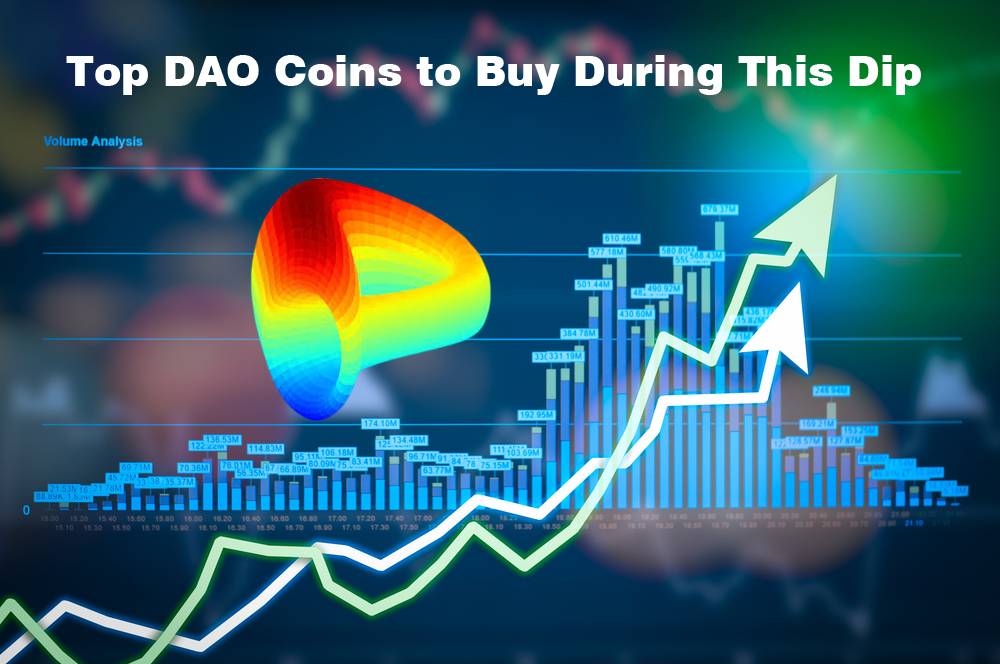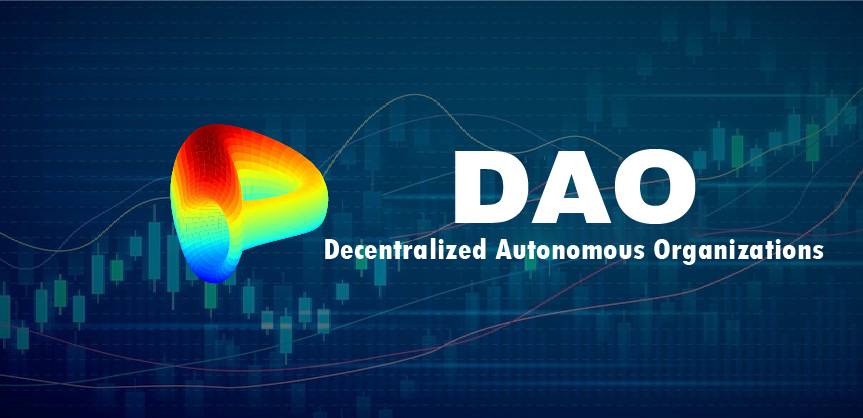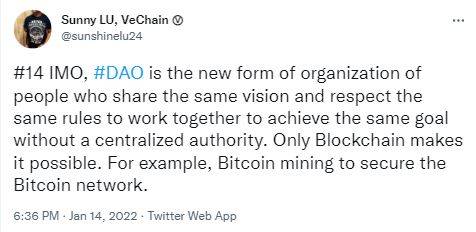
DAOs (Decentralized Autonomous Organizations), according to the technical definition, are social organizations that are represented by rules which are encoded as transparent computer programs. DAO crypto tokens are used for many purposes like investment, buying or crating NFTs, charity, fundraising, and much more.
DAO has seen popularity with utility and holds a promising future. You can start your journey by knowing about top DAO Coins to buy during this dip. DAO is a simple term used as a digital community of like-minded people with a shared bank account.
These people come together to establish a mission and form a group. They then discuss how to fund their DAO’s mission.
What is ‘The DAO’?
The DAO was an early repetition of the modern decentralized autonomous organizations. People who owned DAO tokens could profit from the organization’s investment by benefitting from the price appreciation of the respective tokens or reaping dividends.
Soon after token sales, some developers expressed concern about a bug in the DAO’s smart contracts that could allow harmful actors to drain its fund. This incident led to changes made in the way DAO was dealt with. The DAO was a project founded in 2016 that ultimately had some shortcomings that led to a split of the Ethereum network.
DAO exists as a set of contracts that is on the Ethereum blockchain. The prices are measured in market capitalizations like any other crypto. It doesn’t have a physical address or formal rule of management.
DAOs have built-in treasuries, which are only accessible only with the approval of their members. These decisions are made through proposals the group votes on during a specific period. There are various ways to participate in a DAO, but it usually takes place through the ownership of a token.
DAOs operate through smart contracts that are essentially a chunk of codes that execute automatically whenever a set of criteria are met. Nowadays, smart contracts are developed on numerous blockchains. It’s through these smart contracts, DAO rules are established.
People with a stake get the right to vote and influence how the organization operates. It happens by these stakeholders deciding on or creating a new governance proposal. DAO is completely autonomous as well as transparent. Anyone can view their code as they are built on open-source blockchains.
Significant Steps in the Launch of DAO
Some significant steps occur for the launch of a DAO. These steps are:
- Smart Contact Creation The developer or a group of developers first creates the smart contract behind the DAO. After its launch, they can change the rules only through these contracts via the governance system. It requires them to extensively test the arrangements to ensure they haven’t overlooked any critical detail.
- Funding After creating the smart contract, the DAO needs to determine its funding. The next step is how to enact the governance. Mostly, tokens get sold to raise funds. These tokens provide holders with voting rights.
- Deployment After the majority of the things is set up. The DAO gets deployed on the blockchain. From this moment, stakeholders decide the future organization. The creators of the intelligent contract no longer influence the project anymore.
Why do we need DAOs?
As a digitally-run organization, Dao has several advantages over traditional organizations. Some of the key benefits are:
- A lack of trust is needed between the two parties. Unlike a traditional organization where the people behind it need to be trusted, with DAOs, you only need codes to be charged. These codes are available publicly and can be actively tested before launch. After its launch, every action a DAO undertakes has to be approved by the community, making it completely transparent and verifiable.
- No hierarchical structure Even though these organizations have no hierarchical structure, they still can accomplish tasks and grow under the control of stakeholders via a native token. The reason lack of hierarchy is beneficial here is because, by this, the stakeholders can put forward an innovative idea that an entire group can consider and might improve upon
- Voting rights Solving the internal issues is made easy from the voting rights system. It takes less time to find the solution with pre-written rules in the smart contract.
Understanding the DAO (Decentralized Autonomous Organization)
DAO was an organization designed to be decentralized and to be automated. It acted as a venture capital fund based on open-source and didn’t have a typical management structure of BODs.
To be fully decentralized, DAO is unaffiliated with any particular nation-state, still using the Ethereum network. The developers believed that they could eliminate human error or any manipulation of investor funds by giving decision-making power to an automated system.
DAO was then designed to allow investors to send money from anywhere anonymously worldwide. DAO then provided those owners with tokens and gave them voting rights. It launched in late April 2016 and raised more than $150 million in funds.
Types of DAO
It is crucial to understand that DAO is a much broader term that surpasses many different kinds of businesses and groups. Any two collective can be completely different, but still, both of them can be a DAO. Here are a few examples of popularly known DAOs:
Claim up to $26,000 per W2 Employee
- Billions of dollars in funding available
- Funds are available to U.S. Businesses NOW
- This is not a loan. These tax credits do not need to be repaid
- PleasrDAO collects various NFTSs as well as invests in other assets
- HerStory DAO funds and manages projects by Black women as well as non-binary artists
- Komorebi Collective DAO funds women and non-binary crypto funders
- Friends with Benefits DAO, an exclusive social club where you pay to enter
- MetaCartel Venture DAO, a for-profit business that invests in the early decentralized application stage
DAO was earlier named as “The DAO.” Its structure was made of complex smart contracts running on the Ethereum blockchain. All of which were supposed to act as an autonomous venture fund.
The DAO token was sold over at Initial Coin Offering (ICO) and was provided the ownership stake and voting rights in this funding system. But soon after its launch, about one-third of these funds were drained through hacking, making it the largest one to take place in the history of cryptocurrency.
It resulted in the splitting of Ethereum into two chains:
- Ethereum Blockchain — Here, the fraudulent transaction was effectively revered.
- Ethereum Classic — It abides by the principle of “code is law,” which left thee fraudulent transactions untouched.
What is Blockchain?
Blockchain is a distributed and open ledger that records transactions in code. In simple words, it’s little like a chequebook spread across uncountable computers all around the world. The transactions are recorded in ‘blocks’ and then linked on a ‘chain’ of the previous cryptocurrency transactions.
With the help of a blockchain, anyone who uses cryptocurrency gets a copy of a unified record of transactions. The software tracks each new trade that takes place, and every copy of the blockchain is simultaneously updated along with the latest information., keeping records identical and accurate.
NFTS, DAO and The Metaverse: The New Dimensions of 2022
2021 has seen terms like NFTs and Metaverse. These terms saw such hype that Facebook even rebranded itself to Meta. 2022 is living up to this hype, and new trends are shaping the blockchain and digital infrastructural technologies in the market.
An NFT (non-fungible token) is data added to a file that creates a unique signature and is marked with a code to differentiate it from any other digital replicas. An NFT can be a tweet, an image file, a song, or any other item in digital format.
A Metaverse is a 3D, online and virtual space concept which connects all users in all aspects of their lives. The idea tries to connect multiple platforms on the internet containing different websites and make them accessible through a single browser.
If you own any digital item in the Metaverse, you need a secure way of showing its ownership. Blockchain helps in providing a decentralized and transparent platform to deal with this issue. The key aspects of blockchain that suits the Metaverse are:
- Digital proof of ownership
- Digital collectability
- Transfer of value
- Governance and accessibility
- Interoperability
A list of Top DAO Coins to Buy During This Dip
The way DAOs have seen the increase. It’s on the way to becoming the gold standard for projects looking at creating self-sustainable applications and the service around the blockchain industry. It will unlock new opportunities for an average blockchain application user to contribute and vote for non-developmental and developmental changes.
Below is the list of 10 Top DAO coins to buy during this dip and how their members can reach consensus and form decisions. What must be noted is that various DAOs serve different purposes like venture and investment, grants, social and media. These top DAOs are mostly DeFi (decentralized finance) protocols.
- Uniswap DAO — UNI, a governance token, was launched in September 2020 by the development team of Uniswap as a part of the plan to have a competitive decentralized exchange and enable self-sustainability. This act of Uniswap unlocked a new governance structure giving them an official say over the day-to-day running of the project.
Anyone with a UNI token could vote or delegate vote for a development proposal that could alter the infrastructure of the Uniswap Protocol. The introduction of UNI gave the sole responsibility to determine the development decisions to Uniswap.
The governance token holders have collective control over the following resources:
- Uniswap Governance
- UNI community treasury
- SOCKS liquidity token
- Uniswap Default List
- Protocol free switch
Uniswap is a DeFi protocol used to exchange tokens and cryptocurrencies provided on a blockchain network. As of October 2020, the market capitalization for the UNI token is over $500 millionUniswap aims to create a more efficient market by using liquidity pools instead of serving as a market maker.
Uniswap was estimated as the most prominent decentralized exchange and 4th largest cryptocurrency exchange overall according to trading volume. Uniswap was generating fees of US$2-3 million daily approximately for liquidity providers.
- Aave DAO — Aave, a DeFi protocol adopted as a dynamic governance system, allows users to develop and manage crypto ecosystems actively. This governance system was possible by introducing AAVE tokens that provided means of distribution of voting power to Aave users.
Aave is designed to act as a complete decentralized and secure ecosystem of lenders and borrowers; it offers the users and lenders a passive interest income on the assets, contributing to the liquidity pool. Aave has partnered with many developers like:
- Axie Infinity
- Pixelcraft Studios
- Balancer
Aave lets users borrow digital assets and earn interests on deposit/loan as it’s an open-source and fully decentralized autonomous organization built on the Ethereum platform.
- MakerDAO — MakerDAO was one of the 1st DeFi projects that capitalized on the possibility of on-chain governance. MKR is a governance token issued through a protocol that distributes voting power to the users. MKR tokens are either minted or destroyed depending on the debt status of the MakerDAO ecosystem.
MakerDAO raised a total of $54.5M fund over 8 rounds. It is funded by 15 investors, Bloccelerate and Inflection being the most recent investors.
- Compound — It is another effective on-chain government ecosystem that elevates users to decision-makers when they have COMP tokens. COMP is the protocol’s governance token. Compound is an interest rate protocol based on an algorithm designed for developers to unlock financial applications.
Compound allows you to borrow money by putting other cash as collateral. For example, if you have bitcoins, you can keep them as collateral and get dollars. The compound application is built on Ethereum and thus can’t be censored, making it accessible to anyone over the internet. All calculations are done by thoroughly audited code.
- Decred — Unlike all the protocols stated so far, Decred is a kind of blockchain on its own. Decred uses a hybrid mechanism for consensus, which combines PoW and PoS protocols. Decred’s GUI wallet, Decrediton, for macOS, Windows, and Linux. With voting support, it even offers the ability to buy tickets and participle in governance.
- SushiSwap — The system of SushiSwap resembles the working community-powered governance structure. SushiSwap’s governance has relied majorly on an off-chain system. The voting here takes place on Snapshot- a gasless and decentralized voting dashboard.
The metric for voting used in SushiSwap Snapshot is SUSHIPWAH. To be an eligible voter, you must hold SUSHI in any of the following means:
- 1 SUSHI token = 1 SUSHIPOWAH
- 1 SUSHI in SUSHI-ETH pool = 2 SUSHIPOWAH
- 1 SUSHI held via xSushi = 1 SUSHIPOWAH
- Synthetix DAOs — Synthetix allows its members to elect representatives periodically and carry out various roles in a dynamic DAO system. The robust nature of the governance system makes Synthetix unique. Below are the six governing bodies on the Synthetix ecosystem which play specified governing roles:
- Spartan Council
- Protocol DAO
- Synthetix DAO
- Ambassador DAO
- Grant DAO
- Core Contributors
- Ox DAO — Ox is a decentralized exchange (DEX) looking to transition from a monolithic governed system to a dynamic system that users power. ZRX is the governance token for Ox as it assigns the voting power to its holders. Anyone holding ZRX is eligible to participate in the Ox protocol governance. It enables the peer-to-peer exchange of assets on Ethereum.
- Curve DAO — An on-chain governance system was introduced by Curve in mid-2020 as a Curve DAO token (CRV). This token’s maximum supply is 3,303,030,299 CRV and has a circulating supply of over 420,000,000 CRV.
- UMA DAO — UMA protocol lets users create synthetic-based assets on the Ethereum blockchain. UMA empowers the UMA token bearers to govern certain operations, some of which are:
- Voting on price metrics
- Managing the infrastructural design of a protocol
Final Word
DAOs benefit their stakeholders by carrying out corporate operations autonomously by smart contracts. It provides complete ownership on decision-making which respectively can be rewarded on the growth of the DAO.
The legal challenges of DAO are clarified and managed. More and more organizations may adopt the DAO platform for their business. All the factors point that DAO is a safe place to enter. It allows the organization to break free of reliance on traditional institutions.
Designing an excellent DAO involves putting down efficient consensus rules that can solve complex problems. The real challenge that DAO might face while its implementation would not be purely technical but social.











